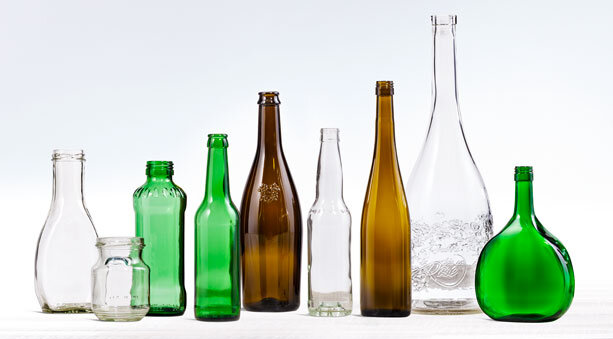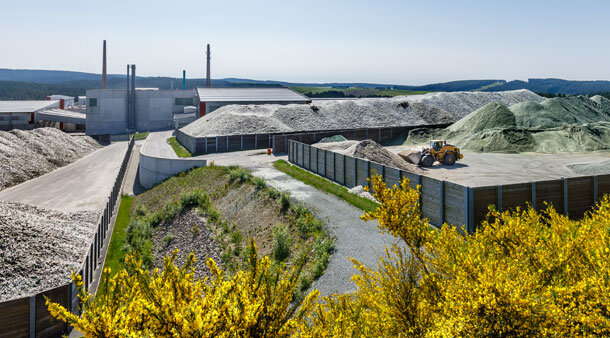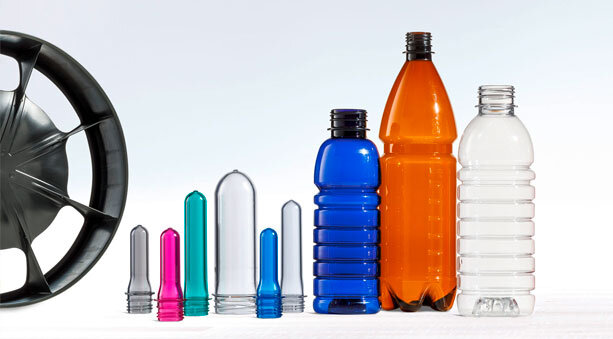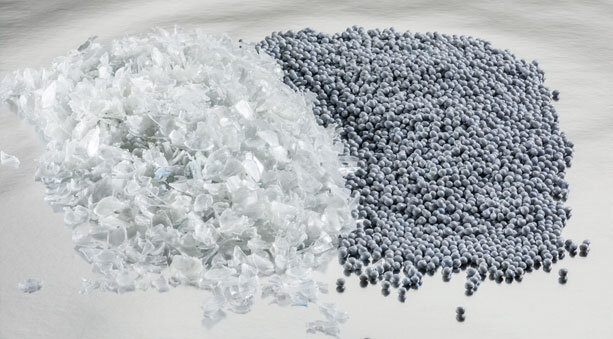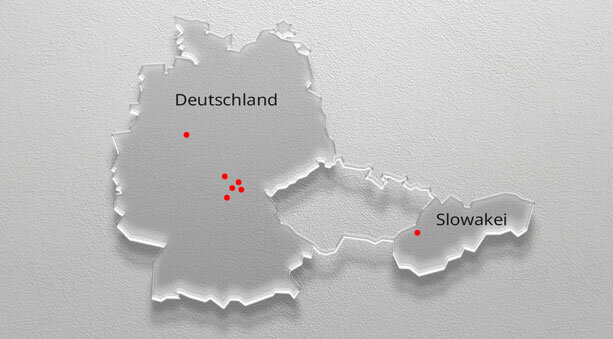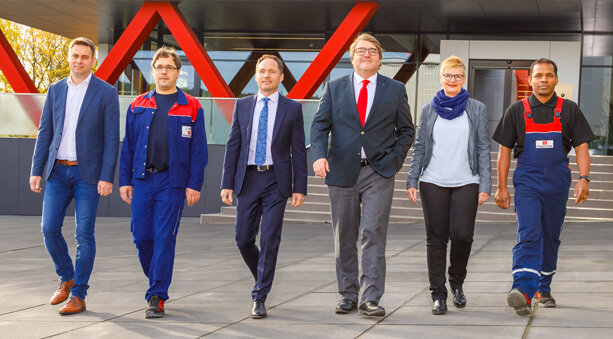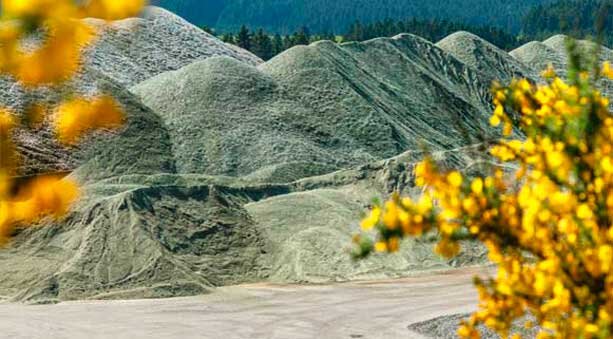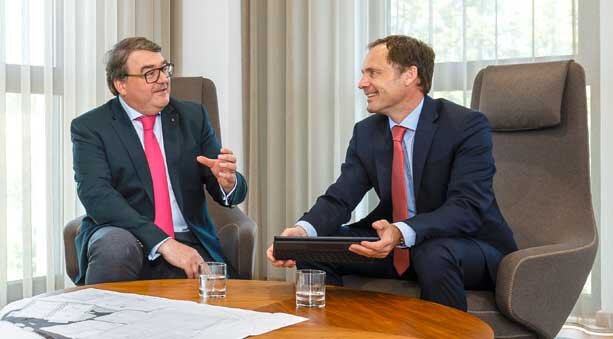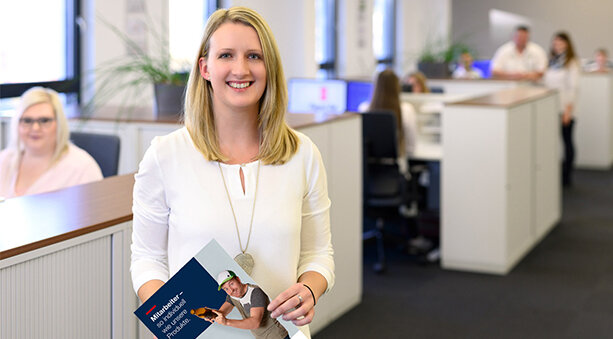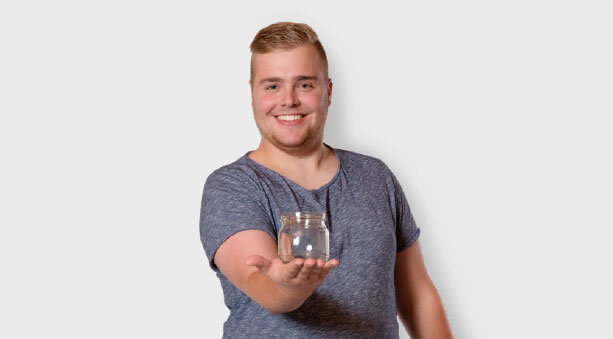We recognised the challenge in recycling at an early stage and invested in our own waste glass processing plants. At our plant in Steinbach am Wald, we annually process more than 600,000 tonnes of collected waste glass into reusable material. With our plants, which are among the most modern of their kind, we achieve optimised sorting results and thus reducing the amount of non-recyclable waste materials. By avoiding melting losses when using waste glass in the glass production, more than 725,000 tonnes of primary raw materials such as sand, lime and soda can be saved. In the production of green glass, we are able to use up to 98 % cullet and sowith make glass containers almost entirely of recycled glass. In addition, waste glass melts at a significantly lower temperature than the batch of primary raw materials, which further reduces our CO2 footprint.
Container glass is melted at a furnace temperature of around 1,600 degrees Celsius in a continuous process – 24 hours a day, seven days a week. In today's generally energy-intensive production of glass containers, we strive to consistently reduce our CO2 footprint. We ensure that our furnaces continue to be state-of-the-art by regular general overhauls and new investments. We do not shy away from any risk, such as the development and installation of the first LoNox melter in 1987 at the plant in Steinbach am Wald, which reduces the absolute NOx emissions by a multiple. We make use of the waste heat from our furnaces in batch preheaters and cullet preheaters, thereby reducing the energy input in the actual melting process. The further development of furnace designs and energy and combustion technologies is one of the most important topics in our research and development department.
Our modern glass processing machines can produce up to one million glass containers per day under the most difficult external conditions. In particular, the heat development leads to great strain on the machine technology and a high demand for cooling air for the glass containers produced. In order to meet our ecological responsibility in this area as well, we consistently invest in the latest cooling technologies and compressor technology. By using servo motors in the IS machine technology (NIS), the need for energy-intensive compressed air is reduced to a minimum. Modern cooling processes, such as the InVertiFlow process, help us to bring the cooling capacity more directly into the product, thus further minimising the energy consumption in the air production.
Production downtimes and poor quality are a major source for economic and ecological waste. To counteract this, we are constantly investing in the most modern inspection technology at all of our locations. Our containers pass through a large number of inspection systems on their way to palletising, starting with a gob weight control before they are even produced. With the infrared fluoroscopy (XPAR) of the glass containers while still hot, we can intervene in the production process at an early stage with possible corrective measures. At the cold end we inspect the finished glass containers in a multi-stage process. This is supplemented by a statistically complex sampling in our fully automated MiniLabs.
Our exhaust gas treatment systems help us to meet the legal requirements of the TA-Luft (Technical Instructions on Air Quality Control) and the requirements of the BimSchG (Federal Emission Control Act). Our sense of responsibility and the tightening of the legal requirements allow us to continuously invest in modern waste gas treatment systems. This is why we have installed SCR (selective catalytic reduction) systems at three of our plants since 2018. In these plants, the additional injection of ammonia water results in significantly more nitrogen oxides being bound than in conventional systems. This way, we guarantee a constant value of less than 500 mg per standard cubic metre of exhaust air.
Our company waste water is treated in our own waste water treatment plants. The cooling water for the production is fed into the production process by pumping from the pond. From there, it returns with its dirt load via various separation systems back into the pond, thus completing the cycle. The purified permeate is returned to the cycle, while the dirt from the plant is recycled in an environmentally friendly manner.
Wiegand-Glas has been a member of the Bavarian Environmental Pact since 1999, participant of the Sustainability Agreement of Thuringia since 2014 and member of the Hydrogen Alliance Bavaria since 2020.
These initiatives are voluntary agreements between the respective state governments and the regional economy. The common goal: the increased protection of the environment. The Bavarian Environmental Pact, which was established in 1995, was the first mutual agreement in Germany on a cross-thematic and cross-sectoral basis that has developed the cooperation between the state and the industry in the environmental sector into an environmental partnership. In a mutual agreement, environmental protection is to be expanded and a sustainable environmentally compatible development is to be secured and promoted in an economically sensible manner.
For many years, we have been working closely with our customers in the processing of post-consumer PET bottles. In a "closed loop" model, we take care of the entire treatment process of the pressed bottles, from washing and sorting to regranulate, including the necessary logistics. We do the regranulation and its refinement to food-grade quality in our own in-house recycling plant thus having very high quality recycling material to feed into the product cycle.
In around 20 years, we have processed almost one hundred thousand tons of recycled material into our preforms. Not only the demand, but also the requirements for the quality of the recycled material have increased steadily in recent years. Since it is becoming increasingly difficult to get high-quality recyclate in sufficient quantities on the market, we have decided to take the initiative ourselves. Together with the leading technology providers, we have designed an unique plant according to our ideas which has enabled us to meet our high quality standards since October 2020.
We demonstrate our ecological responsibility by also being involved outside our company premises. Precisely because the recycling of PET bottles in Germany is already achieving very high rates of up to 97 %, we are sure that positive suggestions from here can be applied to other plastics and in other countries. With this attitude, we have joined this alliance at EU level and would like to contribute our experience in the areas of design-for-recycling, collection and sorting as well as processing recyclates.
We have joined this initiative and are committed to ensuring that the loss of plastic granulate to the environment, no matter how minimal it is, may never be accepted as inevitable. We create the technical and organisational conditions to prevent granulate spills and ensure that spilled granulate does not end up in the environment.
There are no barriers between our individual business units, especially when it comes to man and the environment. We use the waste heat from the glass plant in Großbreitenbach to generate the cold that we need to cool our tools and machines in the neighbouring PET production. Furthermore, we use the waste heat from the compressor systems in the PET plant to heat our administration building, thus making a significant contribution to reducing CO2 emissions.
As a mass producer with customers all over the world, we transport several billion goods by road, rail and sea every year. The optimal use of the loading capacity is one of our top priorities. This is how we constantly review the packaging specifications of our products to find the optimum heights, quantities and packaging materials used. This allows us to save many tonnes of CO2 every year.
The more than 80 million tonne-kilometres travelled by rail since 2013 speak loud and clear. The maintenance and further development of our rail connections is a central issue for us. In the medium to long term, we are planning a significant expansion of outbound rail services in combination with inbound raw material transports.
The development and use of alternative drive technologies are essential tasks for our time. While we have already been able to convert our internal transport almost completely to electrically operated industrial trucks, we are still in the test phase for incoming and outgoing transports. Having already gained initial experiences with LNG-powered trucks, the first test with hydrogen-based technology is still pending.
